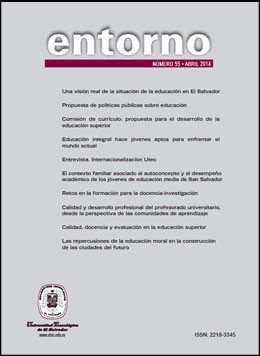Educational experiences in environmental education of students of general studies in higher education institutions in the southern area of Puerto Rico
DOI:
https://doi.org/10.5377/entorno.v0i56.6267Keywords:
Environmental education, Educational experiences, Ecological intelligence.Abstract
An Environmental Education (EE) course for higher education students in Puerto Rico appears to be absent in the programs of the institutions in the southern area. The main purpose of this study was to determine the educational experiences in EE of higher education undergraduate students in general studies from the southern area of Puerto Rico, in order to create a formal curriculum that promotes EE topics to follow the recommendations of both national and international organizations. The theoretical framework proposed for the research encompasses Daniel Goleman´s paradigm of ecological intelligence. According to Goleman (2009), ecological intelligence is the ability to learn from experience and to properly treat the environment.
An Environmental Education (EE) course for higher education students in Puerto Rico appears to be absent in the programs of the institutions in the southern area. The main purpose of this study was to determine the educational experiences in EE of higher education undergraduate students in general studies from the southern area of Puerto Rico, in order to create a formal curriculum that promotes EE topics to follow the recommendations of both national and international organizations. The theoretical framework proposed for the research encompasses Daniel Goleman´s paradigm of ecological intelligence. According to Goleman (2009), ecological intelligence is the ability to learn from experience and to properly treat the environment.
With the purpose of targeting the objective of the research, a survey entitled “Educational experiences in Environmental Education” was created. This auscultated the areas of participation, teaching and learning strategies, and knowledge. The study conducted was comparative, with a mixed approach. The sample consisted of higher education undergraduate students from the southern area of Puerto Rico coming from the three universities with the highest registration.
The results from the Kruskal-Wallis test were not representative (N = 63) = 1.351, p = .509. It can be concluded that there are no significant differences among university students from the different institutions in the southern area of Puerto Rico, in relation to the educational experiences that these students exhibit, at a significance of 0.05. This explains that the participants of the three institutions felt that their educational experiences in EE are mostly poor (46 %). Therefore, it can be stated that the potential of universities to develop environmental education and to establish close cooperation amongst the various institutions of higher education should be considered, as established by the United Nations Educational, Scientific and Cultural Organization (UNESCO).
Entorno, august 2014, issue 56: 78-90
Downloads
677
Downloads
Published
How to Cite
Issue
Section
License
© Entorno
It is required that the authors transfer the right of re-production of their articles to the Entorno Journal

